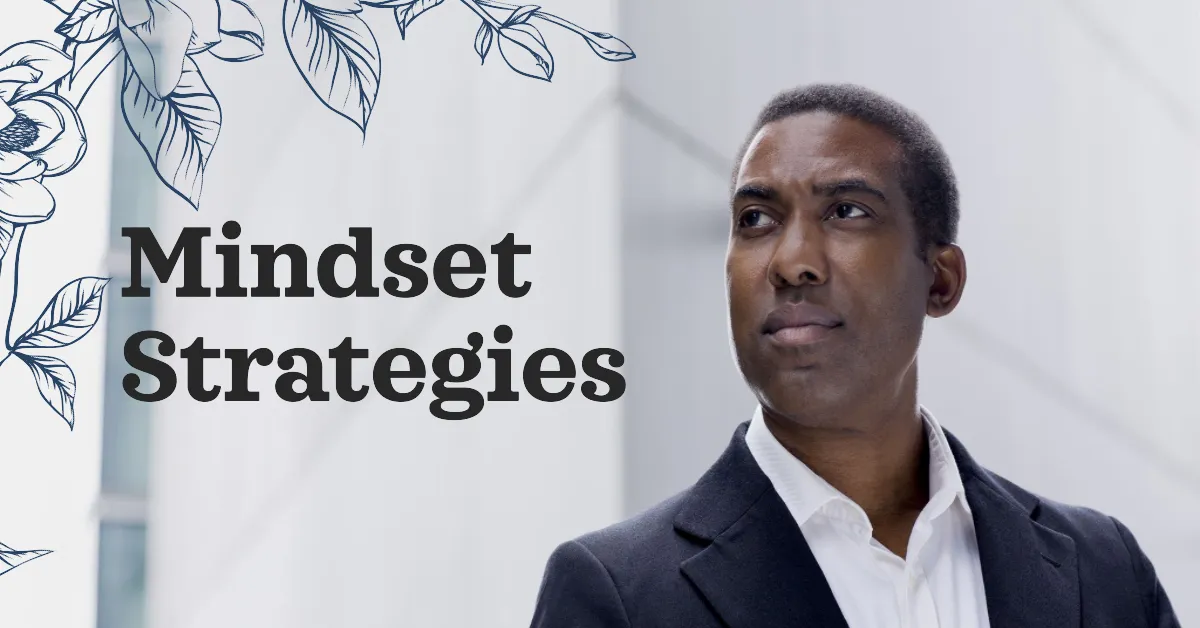Do you often feel like you’re not reaching your full potential in your career? Do you struggle with self-doubt and limiting beliefs that hold you back from achieving your goals? If so, mindset coaching may be the solution for you.
Mindset coaching is a powerful tool that can help business professionals unlock their full potential by identifying and overcoming limiting beliefs and behaviors. By working with a mindset coach, you can develop a personalized plan to achieve your career goals, implement effective mindset strategies, and measure your success along the way. With the right mindset coaching, you can break free from self-imposed limitations and reach new heights in your professional life.
Table of Contents
Key Takeaways
- Mindset coaching can help individuals unlock their full potential by overcoming limiting beliefs and behaviors, developing a positive mindset, and promoting self-care practices.
- Finding the right mindset coach involves considering their experience, compatibility, and results.
- Changing mindset is a process that takes time and effort, involving setting realistic goals and identifying actions that support growth and development.
- Effective communication with colleagues and building strong relationships with clients are essential for achieving success in team projects and taking a career to new heights.
Understanding the Power of Mindset Coaching
If you’re looking to up your game in the business world, understanding the power of mindset coaching can be a game-changer. It’s easy to get bogged down by the day-to-day grind and lose sight of your long-term goals. Mindset coaching helps you develop a positive mindset that will allow you to overcome obstacles and achieve success.
One of the main benefits of mindset coaching is that it helps you identify limiting beliefs that may be holding you back. These beliefs can be subconscious and deeply ingrained, but with the help of a coach, you can bring them to light and start working on overcoming them. Once these limiting beliefs are addressed, you’ll be able to approach challenges with a more positive and productive attitude.
Another important aspect of mindset coaching is goal-setting. A coach can help you set achievable goals that align with your values and long-term vision for your career. By breaking down larger goals into smaller, actionable steps, mindset coaching makes it easier for you to make progress toward achieving those goals.
Mindset coaching also helps improve overall wellbeing by promoting self-care practices such as mindfulness meditation or exercise routines. When we take care of our mental and physical health, we’re better equipped to handle stress and perform at our best in all areas of life.
To put it simply, investing in mindset coaching is an investment in yourself and your future success as a business professional. By developing a positive attitude toward challenges, setting achievable goals aligned with your values, and addressing limiting beliefs holding you back while improving overall wellbeing through self-care practices like meditation or exercise routine – you’ll have everything necessary for reaching new heights!
Finding the Right Mindset Coach
You want to achieve success in your career, but finding the right person to guide and support you can be challenging. When looking for a mindset coach, it’s important to keep in mind that not all coaches are created equal.
Here are three things to consider when searching for the right mindset coach:
- Experience: Look for a coach who has experience working with people in your industry or field. They will have a better understanding of the challenges you face and how to navigate them.
- Compatibility: It’s essential to find a coach whose personality and coaching style align with yours. You want someone who you feel comfortable opening up to and who understands your goals.
- Results: Look for a coach who has a track record of helping their clients achieve their desired outcomes. Check their testimonials, reviews, and case studies before making any commitments.
Finding the right mindset coach can help you transform your career by unlocking your full potential. With the right guidance, you can overcome limiting beliefs, self-doubt, and fear of failure that may be holding you back from achieving your goals.
Remember that investing in yourself is the best investment you can make – it will pay off in both personal satisfaction and financial gain over time. So don’t settle for mediocre results; find a mindset coach who will challenge and inspire you to reach new heights!
Identifying Limiting Beliefs and Behaviors
Identifying the beliefs and behaviors that are holding you back can be like peeling an onion – each layer reveals a deeper truth about yourself. It’s important to understand that limiting beliefs and behaviors are often ingrained in us from childhood, and it takes conscious effort to identify and change them. A mindset coach can help you with this process by asking thought-provoking questions, challenging your assumptions, and providing support as you work through difficult emotions.
To begin identifying your limiting beliefs and behaviors, start by paying attention to your inner dialogue. What do you tell yourself when faced with challenges or setbacks? Do you tend to blame external factors or take responsibility for your own actions? Next, think about any recurring patterns in your life that may be holding you back. Are there certain situations or people that consistently trigger negative emotions or reactions?
Once you’ve identified some potential areas for growth, it’s time to delve deeper into the underlying beliefs and values driving these behaviors. This is where the table below can come in handy – use it to explore the emotional impact of your current mindset versus a more positive, growth-oriented perspective. By acknowledging how your current mindset is keeping you stuck, while also envisioning a more empowering way of thinking, you can start to shift toward a new reality.
| Current Mindset | Emotional Impact | Growth-Oriented Mindset |
|---|---|---|
| “I’m not good enough” | Insecurity, self-doubt | “I have unique skills and talents that I bring to the table” |
| “It’s too hard” | Frustration, defeatism | “Every challenge is an opportunity for growth” |
| “I don’t have time/money/resources” | Helplessness, victim mentality | “I am resourceful and creative in finding solutions” |
| “I’m afraid of failure/success” | Anxiety, avoidance | “I embrace risk-taking as a necessary part of growth” |
| “Others are to blame for my problems” | Resentment, powerlessness | “I take responsibility for my own actions and reactions” |
Remember, changing your mindset is a process that takes time and effort. But by identifying and challenging your limiting beliefs and behaviors with the help of a mindset coach, you can start to break free from patterns that have been holding you back. As you develop a more positive, growth-oriented perspective, you’ll find yourself making progress toward your goals with more ease and confidence.
Developing a Personalized Mindset Plan
Now that you have identified your limiting beliefs and behaviors, it’s time to create a personalized plan to shift toward a more positive, growth-oriented mindset. Developing a mindset plan is essential for achieving success in your personal and professional life. It helps you stay focused on your goals and overcome any obstacles that may come along the way.
To develop an effective mindset plan, start by setting realistic goals for yourself. Write down what you want to achieve in the short term and long term. Be specific about what you want to accomplish and how you will measure your progress. Setting measurable goals will help keep you motivated throughout the process.
Next, identify the actions or steps that need to be taken to achieve those goals. Break them down into smaller achievable steps that can be accomplished within a reasonable timeframe. This will help prevent overwhelm and make each step feel like a small win toward achieving your bigger goal.
Include practices that will support your growth and development such as meditation, journaling, or reading self-help books. These practices can help reduce stress levels, increase focus, and improve overall wellbeing which are crucial elements in developing a positive mindset.
Creating a personalized mindset plan takes time but it is worth it if you truly desire freedom from limiting beliefs and behaviors holding you back from reaching your full potential. Remember to always celebrate small wins along the way as they add up over time leading you closer to achieving overarching life-changing results!
Implementing Mindset Strategies in Your Career

Now that you have developed a personalized mindset plan, it’s time to put it into action in your career. Applying mindset techniques to your work can help you stay focused and motivated, even in the face of challenges. Effective communication with colleagues is essential for building strong relationships and achieving success in team projects. By implementing these strategies and building stronger relationships with clients, you can take your career to new heights and achieve your professional goals.
Applying Mindset Techniques to Your Work
By incorporating mindset techniques into your daily routine, you’ll be able to elevate your work and achieve greater success. One effective way to apply these techniques is by setting clear goals for yourself and consistently working toward achieving them.
Use the table below as a guide to help you create SMART goals – specific, measurable, achievable, relevant, and time-bound.
| Specific | Measurable | Achievable | Relevant | Time-Bound |
|---|---|---|---|---|
| Increase sales by 10% | Track sales weekly | Develop a new marketing strategy | Boost revenue for the company | Within the next 3 months |
Another way to apply mindset techniques in your work is by practicing positive self-talk. Train yourself to focus on your strengths and capabilities rather than dwelling on your weaknesses. This can help boost confidence and overall performance. Additionally, learn how to embrace failures as opportunities for growth rather than setbacks that define you. By approaching challenges with a growth mindset, you’ll be better equipped to handle obstacles and come out stronger on the other side. Remember, success is not just about achieving goals but also about cultivating a positive mindset that supports continuous personal growth and development.
Communicating Effectively with Colleagues
To effectively communicate with your colleagues, it is important to actively listen and respond with empathy to their thoughts and concerns. This means setting aside your own biases and assumptions, and truly hearing what they have to say.
Here are some tips for improving your communication skills in the workplace:
- Practice active listening by giving your full attention to the speaker and avoiding distractions.
- Use open-ended questions to encourage discussion and understanding.
- Validate their feelings by acknowledging their perspective, even if you don’t agree with it.
- Avoid interrupting or dismissing their ideas, as this can create tension and hinder teamwork.
- Be mindful of your tone and body language, as they can communicate more than words alone.
By implementing these techniques in your daily interactions with colleagues, you can foster a more positive and productive work environment. Remember that effective communication is a key component of success in any business setting, so take the time to invest in developing these skills.
Building Stronger Relationships with Clients
You can strengthen your relationships with clients by taking a genuine interest in their needs and desires. It’s important to remember that clients are people too, and they want to feel understood and valued. By actively listening to them and asking thoughtful questions, you’ll show them that you care about their success as much as they do. This will help build trust and establish a foundation of mutual respect.
In addition to that, make sure to follow through on any promises or commitments you make to your clients. Consistency is key when it comes to building strong relationships, so strive to deliver exceptional service every time you interact with them. By demonstrating reliability and dependability, you’ll prove that you’re invested in their long-term success.
Remember: happy clients lead to repeat business and referrals, which are essential for sustaining a thriving career.
Measuring Your Success and Continued Growth
Growing your business isn’t just about hitting milestones, it’s also about constantly measuring your success and finding new ways to keep growing. Measuring your success is essential in identifying areas where you need to improve or focus more on. Here are three things that can help you measure your success:
- Set SMART goals: Specific, Measurable, Achievable, Relevant, and Time-bound. These types of goals enable you to have a clear understanding of what you want to achieve and how you’ll measure it.
- Keep track of key performance indicators (KPIs): KPIs are metrics for tracking progress toward specific business objectives. They provide insight into whether or not your efforts are bringing the desired results.
- Conduct regular reviews and assessments: This helps you evaluate what has worked well so far and what needs improvement moving forward.
Continuously measuring your success and growth will help ensure that you’re on track with achieving your goals while also allowing you to identify areas where further development is needed. It’s important to remember that growth doesn’t happen overnight but rather through consistent effort over time.
As a mindset coach, I understand the importance of continued growth in both personal and professional aspects of life. You may encounter setbacks along the way or face challenges that seem insurmountable at first glance, but these should never deter you from pursuing your dreams actively.
Remember that every obstacle presents an opportunity for growth; it all depends on how we choose to approach them. With the right mindset coaching techniques in place, such as positive self-talk and visualization exercises, you can overcome any obstacle with ease while staying focused on achieving long-term success for yourself and those around you.




